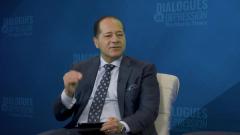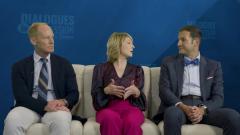
Examining New Agents for MDD Treatment (Zuranolone)
Clinicians continue their discussion of three new agents approved for the treatment of major depressive disorder (MDD).
Episodes in this series

Transcript
Gus Alva, MD, DFAPA: Let’s shift gears a little bit. Zuranolone, what are your thoughts with that?
Greg Mattingly, MD: I’ve had the good fortune of being able to use it in the clinical trials, did the postpartum trials, and then also did the trials for recurrent depression. [I’m] excited by it. It’s another way to hit that gas pedal and brake or the Fred [Astaire] and Ginger [Rogers], however you want to think about it. But you’re hitting the GABA [γ-aminobutyric acid]-glutamate junction. It has rapid onset [with] very different [adverse] effects. [Adverse] effects here are, it’s going to make you sleepy. Take it at night, [and the] first few days, you’re going to be sleepy. But after 2 weeks, we saw women who had bad postpartum depression, and it was gone. It was gone. So to have an as-needed treatment, a 2-week treatment with rapid onset, I think is a really fascinating new option for our patients.
Erin Crown, MHS, PA-C: Especially when we think about the fact that these are women in postpartum status. They need to be present to not only take part in the care of the infant, if they chose to keep that infant in their lives, but to be able to bond with them. That’s a critical bonding time for mom and baby as well. And so to help them get well, so quickly, without the burden of it being an ongoing oral agent is very meaningful.
Craig Chepke, MD, DFAPA: And not just bonding with the infant, taking care of the infant, but most of the time women are still responsible for running the rest of the household, raising the other kids, maybe going back to work, doing other household chores—they have to do it all, and that’s hard enough without postpartum depression. I cannot imagine how tough it is with postpartum depression, so they really need to get better fast. And just the implications of reduced stigma with an as-needed treatment, you only take it for 2 weeks, makes it much more in line with other medical conditions like a sinus infection or something, you just take the medication for a couple weeks and then you’re done with it.
Gus Alva, MD, DFAPA: It’s almost like a CPAC, right? It’s really helping [provide] the opportunity of utilizing something as needed. Because by the way, the majority of patients actually only had to go 1 or maybe 2 rounds, but that was it over the course of 1 year.
Greg Mattingly, MD: In the postpartum [trial], it was just once. In the recurrent depression trials, the majority was once or twice over the course of a year.
Gus Alva, MD, DFAPA: Pretty amazing. And, like you said, sedation being the main [adverse effect]. Obviously, AXS-05, [the adverse] effect profiles [were] very low with that too, very tolerable compounds.
Transcript was AI-generated and edited for clarity.
Newsletter
Receive trusted psychiatric news, expert analysis, and clinical insights — subscribe today to support your practice and your patients.


















